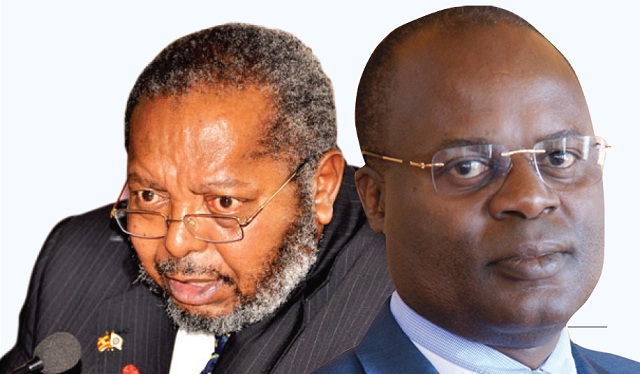
-
Details of Museveni meeting
-
Blow-by-blow account of fight wrecking central Bank
Kampala, Uganda | HAGGAI MATSIKO | Emmanuel Tumusiime Mutebile, 69, the Governor and his Deputy, Louis Kasekende, 59, have until recently been seen as major pillars of Bank of Uganda (BoU).
One has been credited for building the foundations upon which the other was supposed to continue pushing sound policy for the country’s economy. But the two are now involved in a perilous fight that is wrecking the institution with major implications for the economy.
The fight has become so intense that President Yoweri Museveni was on March 26 forced to call a meeting of the feuding camps and crack the whip.
The Independent has learnt that the meeting which started at 3pm at State House Nakasero was attended by Mutebile, Kasekende, former BoU Executive Director Supervision Justine Bagyenda, the Inspector General of Government (IGG), Irene Mulyagonja, and a few members of the parliamentary committee Committee on Commissions, Statutory Authorities and State Enterprises (COSASE).
“I hear Bagyenda does not want to go,” Museveni reportedly said with his characteristic laugh even before the meeting started. That set the tone for the meeting.
Museveni then warned the officials that he was tired of seeing BoU matters in the press.
Until the meeting, it appeared that the IGG might launch an investigation into BoU with Kasekende as a key witness regarding recent job reshuffles Mutebile made that have shaken the bank at its core.
The reshuffle, which affected over 50 top officials of the Bank, including nine executive directors, 13 directors and 24 assistant directors, followed a host of internal scandals at the bank.
The most controversial was the takeover and sale of Crane Bank to DFCU Bank. But there are bungled recruitments, collapse of critical banking sector systems, suspicions of officials colluding with private banks that were allegedly costing the bank billions and undermining its roles, bungled procurements, corruption cases, and mismanagement.
Now, however, the any IGG investigation might either take a different course or not happen at all.
Sources who attended the Museveni meeting say he poured ice on it. At one point, he reportedly, turned to Mulyagonja and asked: “I thought transfers were internal matters of an institution, why are you interfering?”
Mulyagonja said she had received several complaints including from “a senior credible person” who she was willing to disclose only privately to the President.
People who attended the meeting assumed Kasekende is the person Mulyagonja spoke about. This is partly because, The Independent has learnt, that although Mutebile has indicated the IGG cannot interfere in BoU affair due to constitutional protection of central bank independence, Mulyagonja on March 16 summoned three top managers of the central bank; Louis Kasekende, Executive Director Administration Solomon Oketcho and the Bank Secretary, Susan Kanyemibwa. It is not clear how they have responded to the summons. But it is the inclusion of Kasekende that raised major questions at the bank.
Until now Kasekende has remained largely silent as Mutebile appeared to be dealing with intransigency from Bagyenda. However, insiders now say Kasekende has been at the centre of the fight, which has reduced the bank’s topmost leadership into eating each other like grasshoppers suffocating in a polythene bag.
Kasekende, as a deputy governor, has been seen to stand with Mutebile, whose health has been shaky for years. Now, however, as Mutebile struggles to ward off the IGG, sources in the bank claim he can no longer count on Kasekende. If Kasekende is seen to cooperate with the IGG, it will be a major sign.
But when Mutebile got a turn to speak, he said he initially responded to the IGG’s letter in the hope that she would at most investigate issues surrounding the reshuffles. He said he was taken aback when the IGG, in later correspondences, appeared to have formed opinions. He said the IGG correspondence led him respond the way he did – defiantly.
Kasekende exposed?
Throughout the meeting, Kasekende was dead quite, a source who attended said. Another said he was ignored.
Shining the spotlight on Kasekende in this saga is based on his known closeness to Bagyenda whose removal in the reshuffle led the IGG to intervene.
 The Independent Uganda: You get the Truth we Pay the Price
The Independent Uganda: You get the Truth we Pay the Price



My concerns about the Central bank are over its management of monetary policy. Uganda’s currency is very week, ranked amongst the bottom 10 in Africa. For over a decade, interest rates have been and continue to be at double-digit. That has significantly curtailed investment in capital-intensive businesses which is central to job creation and long-term economic growth.
Economics has moved on since the days Mutebile was at Havard or wherever it is he studied. His solutions to steering monetary policy are obsolete and are in part contributing to high youth unemployment.
Uganda needs to reinvent the economy. It will require new thinking at the helm of the Central Bank.
Has this National bank the capacity to repay the accumulated international loans that seem to continue to raise as long serving politicians insist on governing the country as of right!
What if this country seems to want to go the way of governance by a State of Emergency and a Curfew so that the lives and properties of the citizens of Uganda are better protected. Will such a state of political affairs sustain the current stable economic affairs of this African country?
Under such undertones, how can an investor these days try to bring in good money for investment in this country and at the end of the day loose it all at the blink of an eye. Whom is he or her going to blame for such a loss.
Your insinuation of tribal changes by Kasekende wont fly in the Uganda we know. Many posts in government bodies are full of me and you.